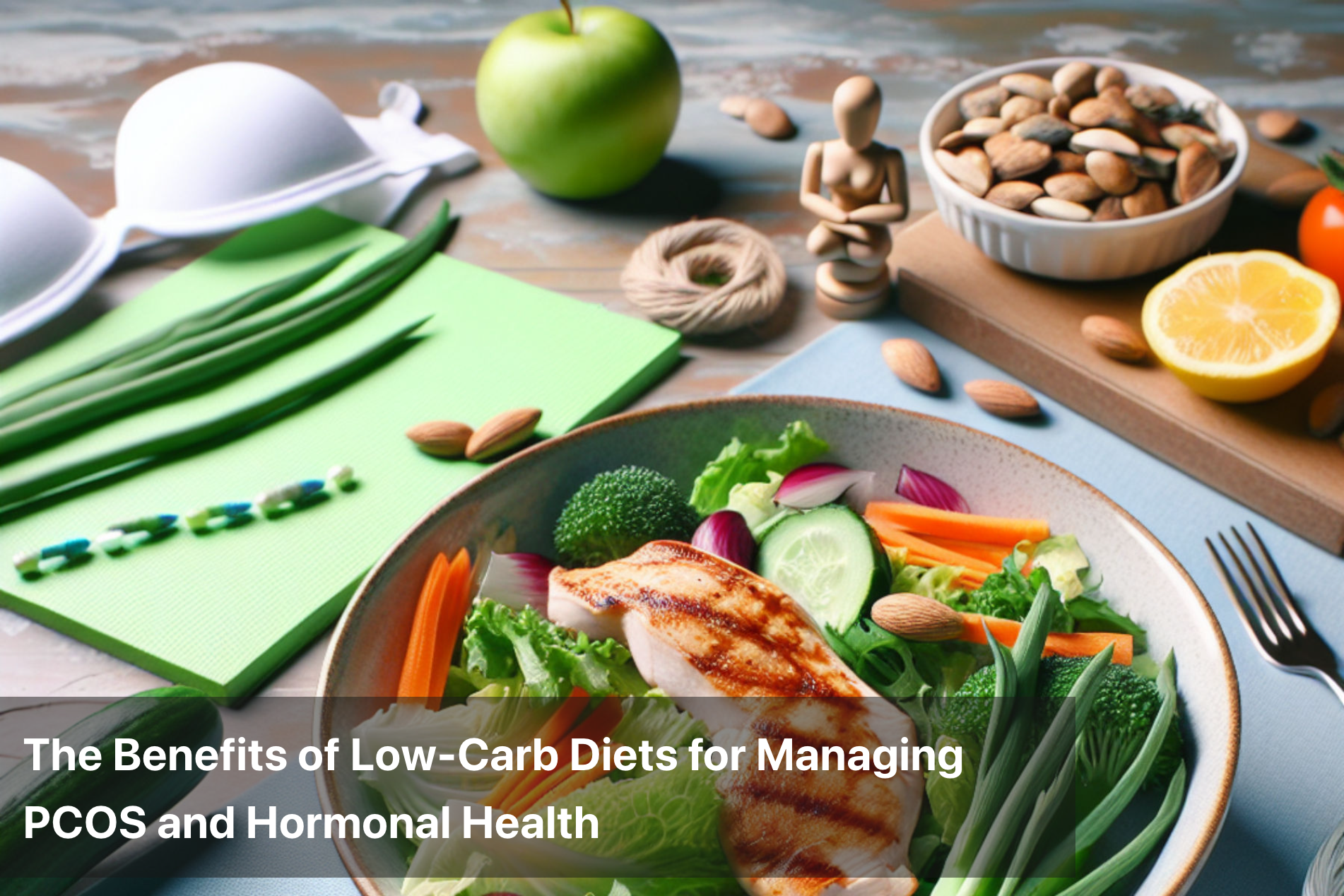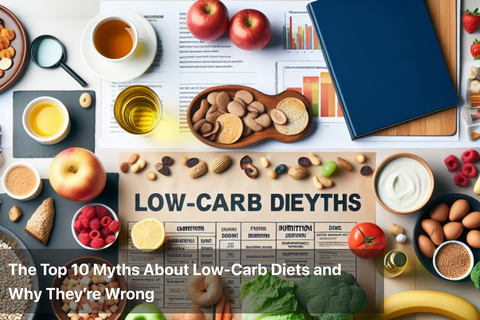
The Benefits of Low-Carb Diets for Managing PCOS and Hormonal Health
Polycystic Ovary Syndrome (PCOS) is a hormonal disorder that affects millions of women worldwide. Characterized by irregular periods, excess androgens (male hormones), and polycystic ovaries, PCOS is more than a reproductive health issue—it is also closely linked with insulin resistance, inflammation, and metabolic dysfunction. Hormonal imbalances like PCOS can have far-reaching effects, impacting weight, mood, fertility, and long-term health outcomes.
One of the most promising dietary approaches for managing PCOS and improving hormonal balance is a low-carb diet. By reducing carbohydrate intake and focusing on whole, nutrient-dense foods, individuals with PCOS can significantly reduce symptoms and improve overall metabolic health.

Understanding PCOS and Hormonal Imbalance
PCOS develops when the ovaries produce an abnormal amount of androgens, which can interfere with the development and release of eggs. Insulin resistance is a major underlying cause of this hormonal disturbance. When the body becomes resistant to insulin, the pancreas compensates by producing more, which can stimulate the ovaries to produce more androgens, disrupting the hormonal equilibrium.
Common symptoms of PCOS include:
-
Irregular or missed menstrual cycles
-
Weight gain or difficulty losing weight
-
Acne and oily skin
-
Excess facial or body hair (hirsutism)
-
Thinning scalp hair
-
Ovarian cysts
-
Fatigue and mood swings
-
Fertility issues
Root Causes of Hormonal Imbalances in PCOS
Several factors can contribute to the development of PCOS and hormonal imbalances:
-
Insulin resistance: One of the primary triggers of androgen overproduction and ovulatory dysfunction.
-
Inflammation: Chronic low-grade inflammation can worsen insulin resistance and disrupt hormone signals.
-
Genetics: PCOS often runs in families, suggesting a hereditary component.
-
Diet and lifestyle: A diet high in refined carbohydrates, sugars, and unhealthy fats can contribute to insulin resistance and hormonal dysregulation.
-
Stress and poor sleep: Elevated cortisol from chronic stress can interfere with other hormones like estrogen, progesterone, and insulin.
How a Low-Carb Diet Supports Hormonal Health
A low-carb diet can offer several benefits for women with PCOS by directly addressing the underlying issues:
-
Improves Insulin Sensitivity: Reducing carbohydrate intake helps lower insulin levels, reducing androgen production and improving menstrual regularity.
-
Supports Weight Loss: Many women with PCOS struggle to lose weight. A low-carb diet promotes fat burning and appetite control, making weight management more achievable.
-
Reduces Inflammation: Whole foods low in carbohydrates are often rich in anti-inflammatory compounds, which support hormonal balance.
-
Balances Blood Sugar: Stabilized glucose levels prevent energy crashes, cravings, and mood swings associated with PCOS.
-
Regulates Ovulation: With improved insulin and hormonal levels, ovulatory cycles may resume, improving fertility outcomes.
Symptoms That May Improve with a Low-Carb Diet
|
Symptom |
Underlying Issue |
Impact of Low-Carb Diet |
|---|---|---|
|
Irregular periods |
Insulin resistance, hormonal imbalance |
Stabilizes insulin and promotes regular ovulation |
|
Acne |
Excess androgens |
Reduces androgen levels, calming skin inflammation |
|
Fatigue |
Blood sugar instability |
Provides sustained energy through fat metabolism |
|
Weight gain |
Insulin resistance |
Encourages fat burning and appetite regulation |
|
Infertility |
Anovulation |
Improves cycle regularity and egg maturation |
PCOS-Friendly Low-Carb Foods to Focus On
|
Food Group |
Recommended Options |
|---|---|
|
Vegetables |
Spinach, broccoli, cauliflower, zucchini, bell peppers |
|
Protein |
Eggs, paneer, chicken, tofu, Greek yogurt (unsweetened) |
|
Fats |
Avocados, nuts, seeds, coconut oil, olive oil |
|
Beverages |
Herbal teas, lemon water, coconut water (unsweetened) |
|
Condiments/Spices |
Turmeric, cinnamon, ginger, garlic |
Lifestyle and Mindset for Hormonal Balance
A low-carb diet works best when combined with lifestyle strategies that further support hormonal harmony:
-
Exercise regularly: Strength training and moderate cardio can improve insulin sensitivity.
-
Manage stress: Yoga, meditation, and journaling can help reduce cortisol levels.
-
Prioritize sleep: Quality sleep is essential for hormone production and metabolic recovery.
-
Track symptoms and cycles: Use apps or journals to monitor how dietary changes impact menstrual cycles, mood, and energy.

When to Seek Professional Guidance
Not all PCOS cases respond the same way to diet alone. It's important to consult a healthcare provider if:
-
Symptoms don’t improve within a few months
-
Periods remain irregular or absent
-
There are signs of nutrient deficiencies (hair loss, brittle nails, low energy)
-
You’re planning to conceive and need help with ovulation support
Summary
A low-carb diet offers a powerful nutritional strategy for managing PCOS and restoring hormonal health. By addressing insulin resistance, reducing inflammation, and supporting weight management, it can significantly alleviate symptoms and improve overall well-being. However, the key to success lies in balance—choosing whole, nutrient-dense foods, maintaining adequate fiber and fat intake, and complementing dietary changes with positive lifestyle habits.
This Blog post is an initiative by Lo! Foods, to provide accurate and Nutritionist / Doctor approved information related to Health. Lo! Foods is India's leading brand for Everyday Functional Foods. Foods designed for specific Health conditions or Needs. Lo! Foods also runs India's largest range of Low Carb Healthy Cloud Kitchens, under the brand names of Lo!, ProteinChef, ATH (All Things Healthy) and DiabeSmart.













Leave a comment
Your email address will not be published.